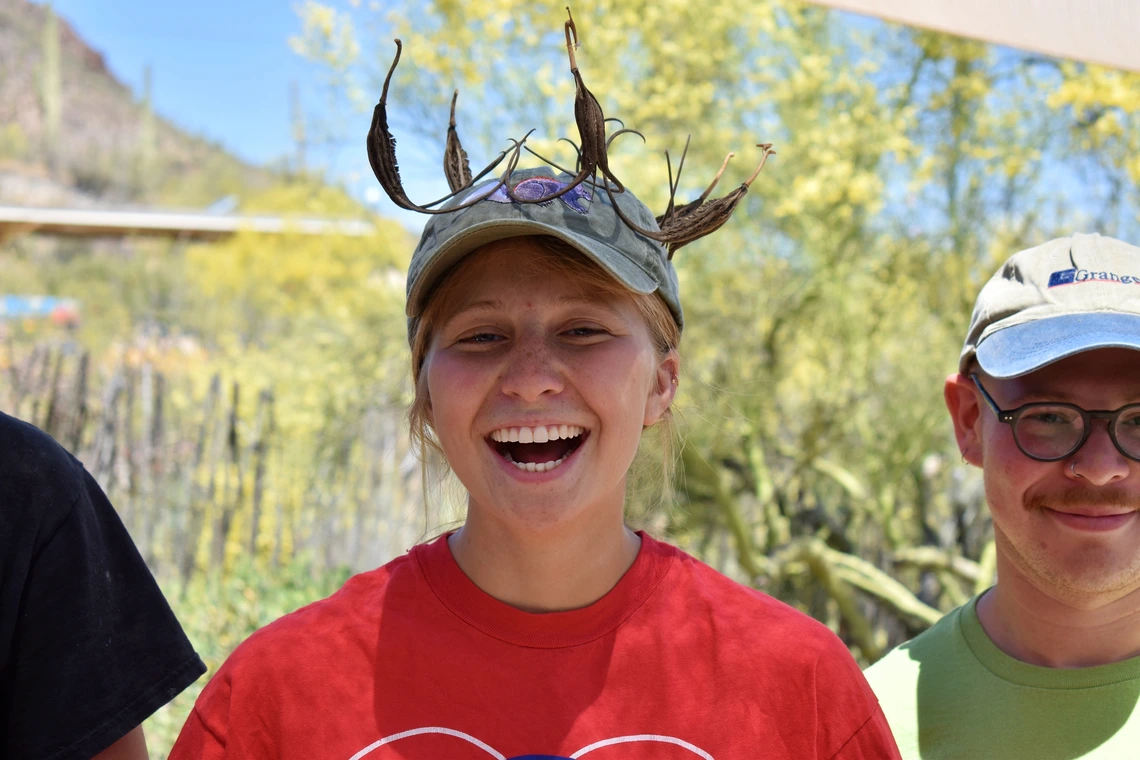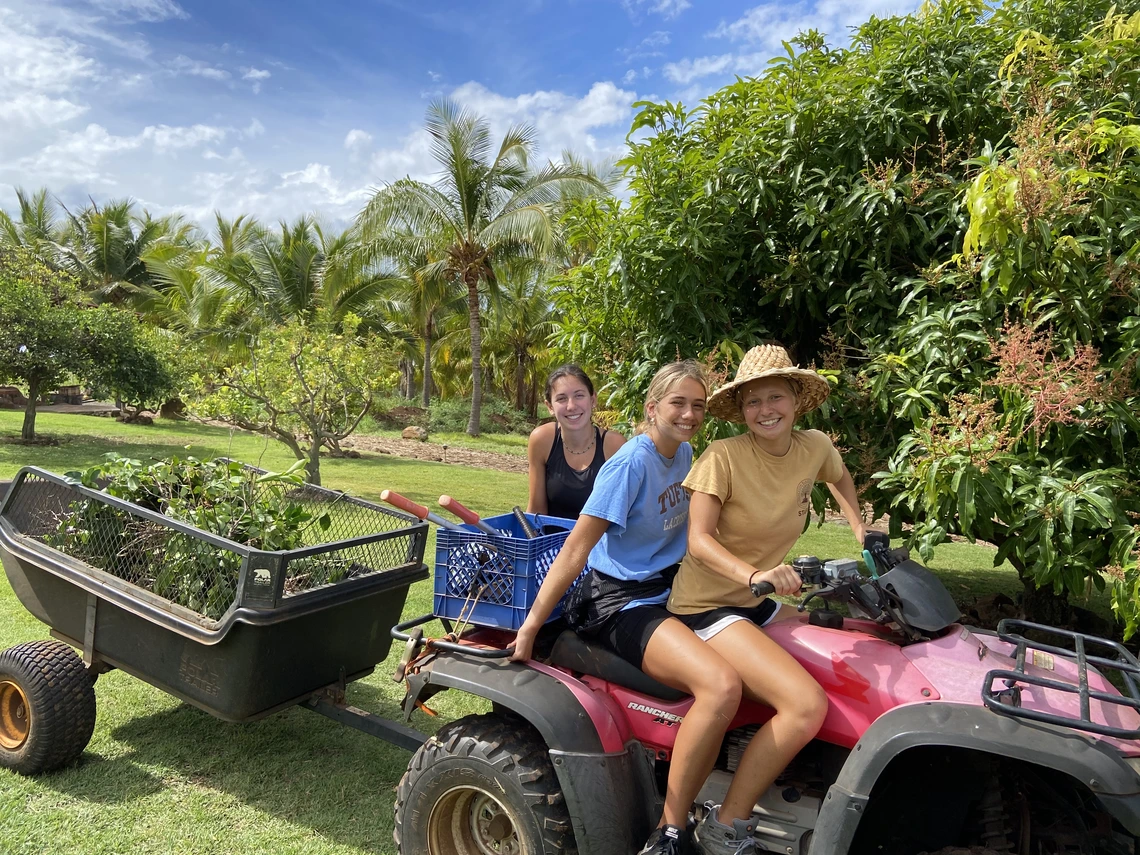Greta Cotraccia: Building Friendships, Growing Roots

Greta Cotraccia is a junior at the University of Arizona majoring in Environmental Studies with a minor in Sustainable Built Environments. A student embedded within a variety of environmental networks on campus, she discusses how she finds inspiration and motivation through her friendships and peers.
In this Q&A, Cotraccia shares her perspective on how environmental awareness and sustainability not only connect people to aspects of society like fashion, agriculture, and urban development, but to each other as well.
How have you been involved in environmental or other activities as a student at the University of Arizona?
Being a student at the University of Arizona has opened a lot of opportunities for me to become more involved in environmental activities in my day to day life.
I am currently an employee of the Office of Sustainability working as a Compost Systems Specialist under the Compost Cats. Through this position I get to work with students and community members to promote the practice of composting food scraps. I have loved this position as it not only connects me to the Tucson community but also the land and greater Sonoran Desert.
Additionally, I am an active member and DEI Chair of the pre-professional environmental fraternity, Epsilon Eta. This organization has connected me with other passionate students that care about the environment. I love being surrounded by friends in an environment where we are always learning from each other and cheering each other on. Seeing peers challenge mainstream ideas and work toward a more sustainable future is extremely motivating and gets me more excited about my studies.

How do you hope to incorporate environmental or sustainability values into your future career goals?
The environment and sustainability are very closely tied to my future career goals. I want to influence my communities to prioritize the environment in decision making and push for more sustainable practices.
Sustainability is very important to me because it is interconnected with equity, social justice, gender equality, housing and many other areas, which I hope to influence for the better with my current and future work. Wherever my path leads, I will approach it with the environment and sustainability as a priority.
Are there any specific aspects of sustainability or the environment that you are particularly passionate about?
There are many aspects of sustainability that I am passionate about, but the areas I find myself coming back to over and over are sustainable fashion and textiles, sustainable agriculture, and sustainable urban development/community building.
I have found many different outlets both in and out of school to explore these areas, and I feel they are target areas in terms of climate change and greater sustainability in the future.
Where have you found community while at the University of Arizona, particularly in terms of connecting with students who are also interested in the environment?
As mentioned before, both my involvement with Compost Cats and Epsilon Eta have provided me with a strong community with students and staff passionate about the environment.
Additionally through my participation in the Diana Liverman Scholars program, I have found a tight knit community of students with many different majors that have a shared interest in the environment and science communication.
All of these involvements have not only provided me with a strong academic support system but also with meaningful friendships that continue to expand with the ebb and flow of students within them.
How do you think students can contribute to encouraging more sustainable behaviors and decisions in places like UArizona?
While I know that the most impactful action must be taken by the University and prioritized on an administrative level, I think students can set an example and show value in prioritizing sustainability.
Sharing and promoting sustainable practices that you may practice to peers, professors and those around you is important to make these changes to feel attainable and realistic. For example I have encouraged many of my friends to participate in the Compost Cat’s Bucket Program to divert food waste from landfills and now more of my friends compost than those who do not.
Talking about sustainability and encouraging others in an optimistic way instead of criticizing others for not doing enough is really important to get others to change their behaviors. I believe as students we have a lot of power to set expectations for our campus and university community and continuing to vocalize the value of prioritizing the environment in the UA’s actions will help to push more sustainable decision making on a larger level.
What benefits can students gain from getting involved with professional development opportunities, such as the Liverman Scholars Program, internships, or the various other programs you’re a part of?
Students can gain a lot from participating in programs such as the Diana Liverman Scholars Program, such as a vibrant community of students and a deeper connection to the greater Tucson community.
Through the Liverman Scholars Program, my team got to partner with Flowers and Bullets, a local collective at the Midtown Farm that expanded my view of sustainability and Tucson.
Building that connection was really meaningful and gave me insight on how to partner with an organization such as Flower and Bullets. It also taught me about the kind of work they do, which is inspiring as I navigate my own career and values.
Why should students care about the environment, even if it isn't their major or area of study?
Students should care about the environment even if it isn’t their major or area of interest because the state of the environment affects everyone whether they acknowledge it or not. Environmental factors affect water availability, property values, mental health, physical health, equity, ease of movement and so many other areas we interact with on a daily basis. You do not need to study the environment in college to have an appreciation and value for it. There are so many ecosystem services that hold up the foundation of how we operate as a country and globe that valuing the environment should be inherent and something that everyone does there part in protecting.
